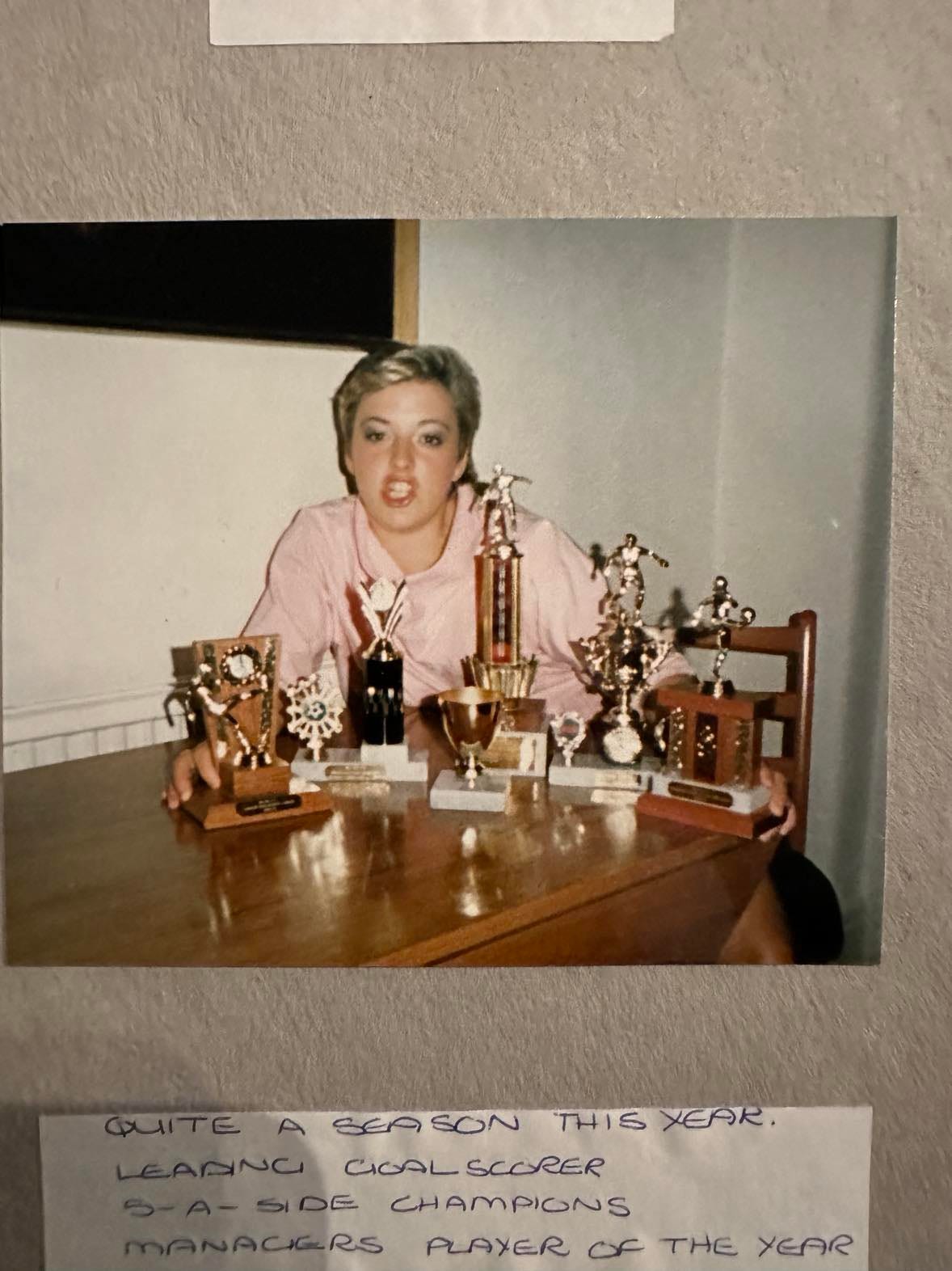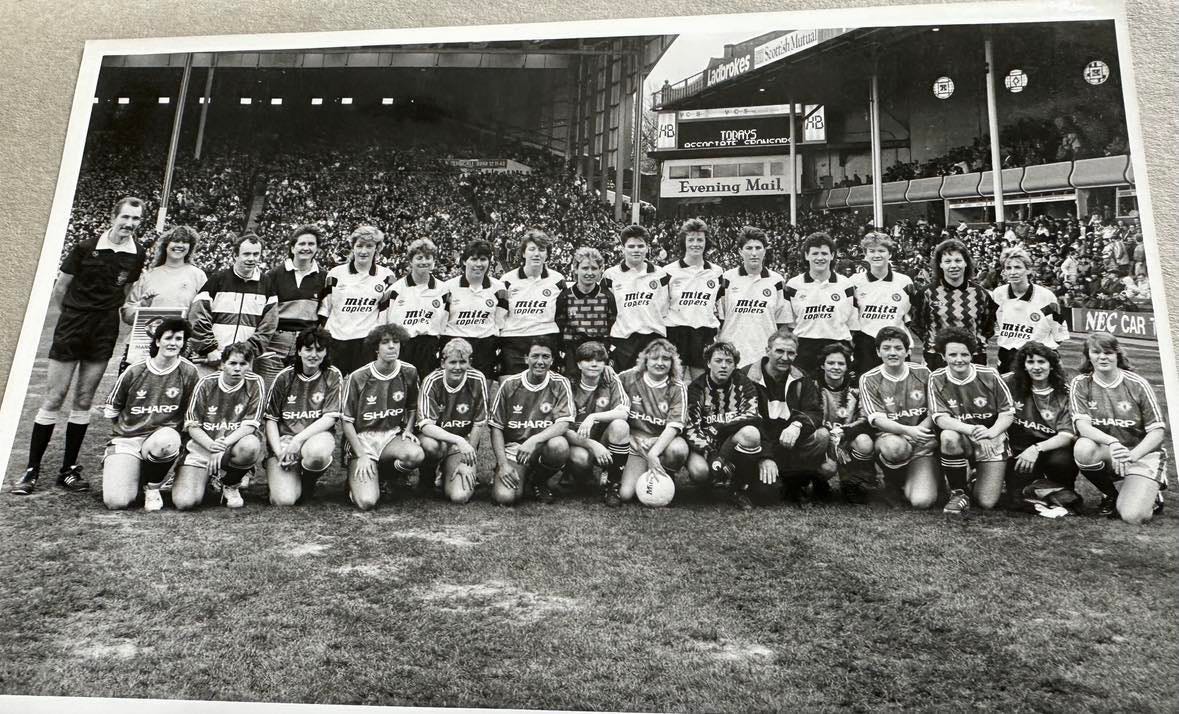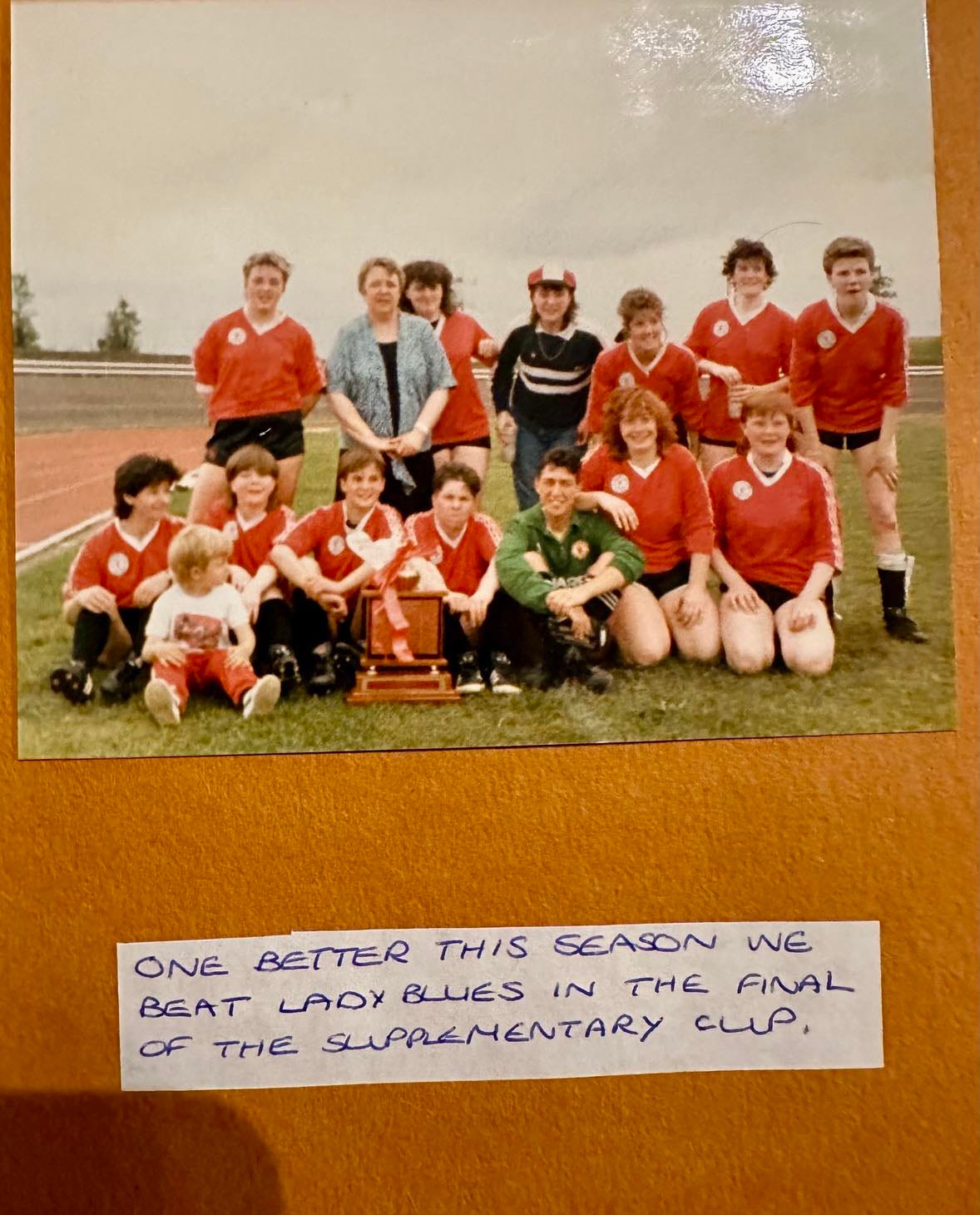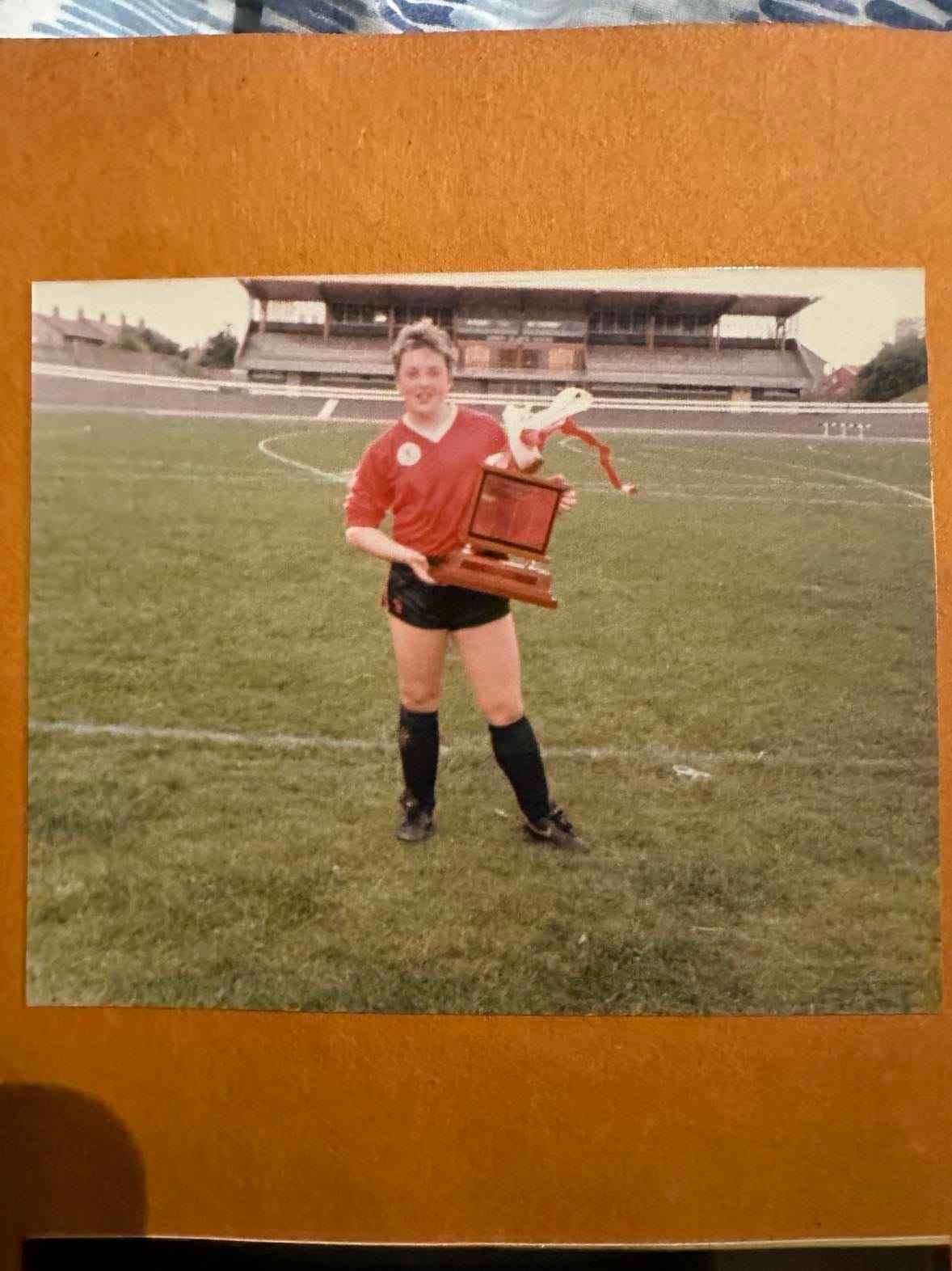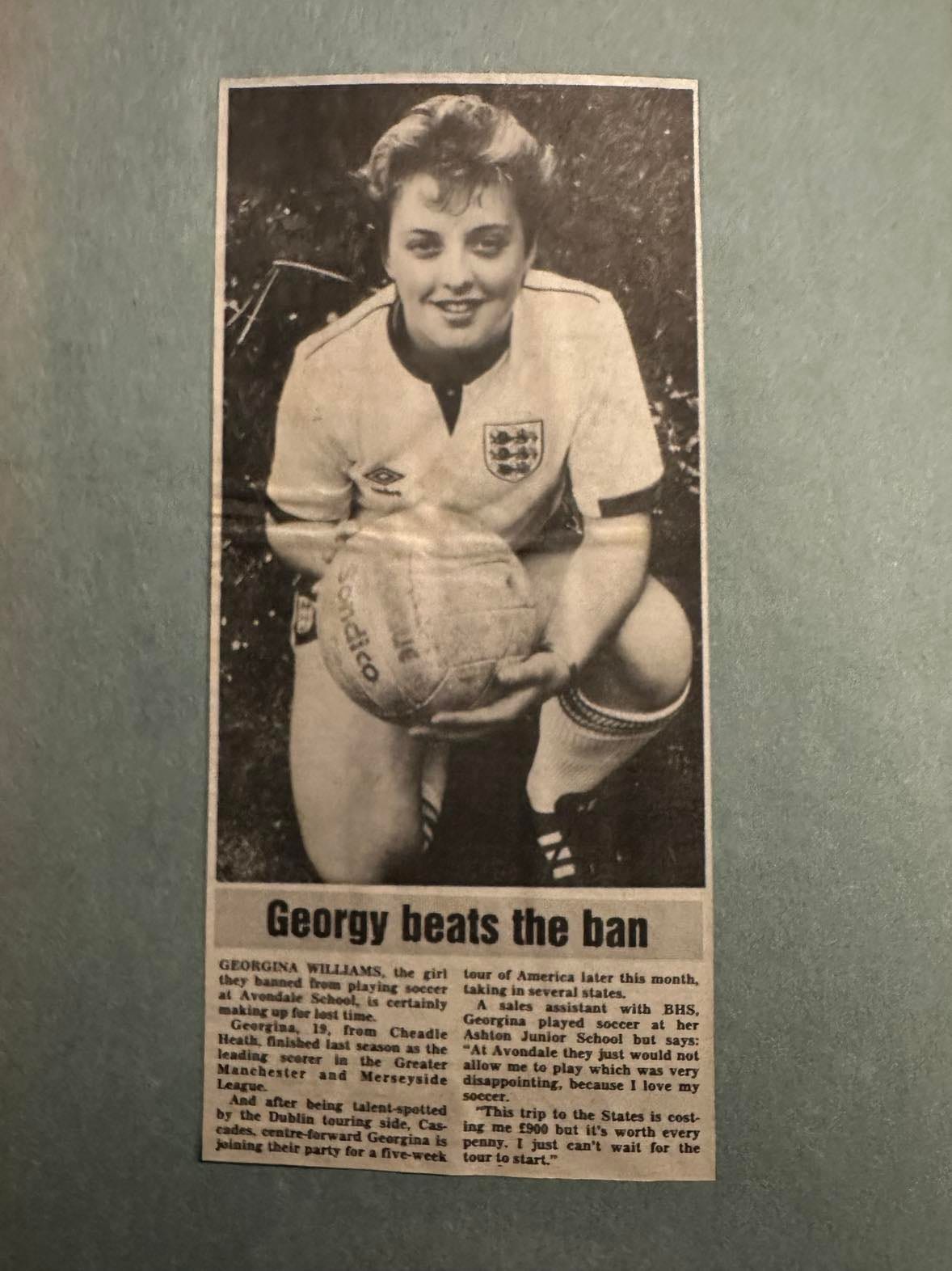Barmy Archives - Georgina Duncan
In issue 13 of Barmy Article I interviewed Georgina Duncan, Utd Ladies player from 1982-1994. These are my favourite features in the fanzine; in my view the most important as they celebrate the real history of the club. The 3rd ex red interview after Michelle Wilcock in issue 2 and Donna Douglas in issue 8.
With issue 14 imminent and a near sell out issue 13 (grab one of the last few copies here) it’s time to share Georgina’s story to a wider audience.
Since this article, Georgina attended the Utd Women game against Everton on Easter Sunday and will feature in an upcoming matchday programme.
Recently I was lucky enough to chat with Georgina Duncan nee Williams who played for Man Utd from 1982-1994.
After 2 previous interviews with ex reds, we extend the period covered with Georgina taking us back to 1982.
“I think it was about 1982 to about 1994 so it was twelve seasons or so. I joined in the last couple of years of Anne Smith’s time as manager.”
For a keen 15 year old female footballer at that time it was a dream to discover the chance to play for the club she supported after limited chances to play while at school.
“My own school were great. I went to Hayes Primary over in Ashton and I played in the school playground and trained with the team but they had to ask permission from our opponents to let a girl play. Only 2 ever said yes. Funnily enough, I got a message the other day that there was an old picture of the school and they said ‘you know you were one of our better players, but the opponents just wouldn't let us’. It was always frowned upon in those days; girls didn’t play football and they weren't allowed to play football, and in secondary school there was just no chance I could play football at all”
How does one go from not being allowed to play to embarking on a 12 year career playing for Man Utd? In those days they just picked up the phone.
“It was funny, I was 15 and playing on the park and in the street like we did. I think it was one of my friends who said to me ‘Why don’t you join a ladies team?’ and I was like, do they have ladies teams? What’s this? Then I think my mum asked around and one of our neighbours put me in touch with Anne Smith so I phoned her and she asked if I could come down to training. That’s when I found out there were ladies football clubs and they were slowly starting to develop.
When I first started we were winning games by 18 or 19 goals, ridiculous scorelines because the competition wasn’t particularly good but that’s how I managed to get into it. Then it just progressed as other clubs got involved. I remember playing against Doncaster Belles or somebody like that in the FA Cup, one of the top, top teams. We kept them at 0-0 for about 20 minutes and then it just went pear shaped and I think we lost 6 or 7 nil. It felt like very early days of something that was starting to grow”
But for a 15 year old to even make that phone call, having barely been allowed to play throughout school, Georgina now found hope in the unknown voice at the other end of the line. A grown up world, but the determination to play football was fierce enough to spur her on
“I was extremely nervous turning up to the Cliff training ground where my heroes from the men’s team trained I was quite overwhelmed and didn’t know what to expect. In my head I felt like my hero, Bryan Robson, training and I always remember what Sir Bobby said to me at the Bobby Charlton soccer school and still use to this day ‘you look smart, you play smart’.
I just went in excited and was welcomed and just thought ‘do your best’. I remembered scoring a goal and thought of the players who had also scored in those nets. I was asked by Anne Smith to sign and was a sub but I knew I had to take my opportunities when they came. After a few appearances, right wing became my position before moving to centre forward as I started to score goals. Over the years though I think I played every position except left wing. I even enjoyed going in goals so I was our reserve goalie even when I was playing as a forward. I had a season in midfield which was probably my favourite season as I could pretend I was Robbo. As I got older I moved further back on the pitch though and finished up at right back”
But where did that determination come from? The stereotype might suggest a father trying to push their passion for football on a daughter, but no. Much like the touching article about Betty Marsh on page 6, this passion was passed down the maternal side of the family
“There was nobody in the family that sort of played football. I was into sport. My Mum was a Utd fan and we used to watch the football and then I started playing at school. She was a huge support for me. At that sort of age I wasn't driving so I had to rely on my Mum to drive me down the The Cliff and to matches so if I hadn’t had her support as well I probably wouldn't have been playing until I was able to drive or sort out my on transport.
She was proud too. She’d come and watch the matches and shout us all on and everything. She just sort of got a bit carried away. If I got brought down or something she used to get louder and louder.
She wasn't sporty herself. She was a musician, a singer and did some TV work with walk ons on Coronation Street and things like that but as a fan she was passionate about the men’s team and then about me playing for the Ladies”
Since Georgina brought up the atmosphere and having passionate supporters on the touchline, I brought up the issue of rivalry in women’s football, the most notable and recent example being the booing of Alessia Russo
“I don’t know, I mean, if someone was jeering me I think it would sort of encourage me to play better. I know some people would probably take it to heart so it’s probably down to everybody’s personality but obviously Russo’s gone. They’ve seen it in the men’s game that they get jeered and booed. I just think ‘the player’s gone’, I personally wouldn’t boo another player because I think well, you’ve done it for a reason. There’s a lot more behind why that player has gone. Is it money? Is it to win trophies? You know as a player you always want to better yourself and be a better player and sometimes you have to move. Sometimes it’s a little bit childish but equally, if I heard them booing me I’d think ‘Right, I want to score a goal against you guys, that will shut you up’, so it’s banter. It’s happened in the men’s game, it’s materialised into the women's game. I can see the fors and against it but yeah, it’s just friendly banter to me”
With bigger crowds comes bigger jeers. Georgina may have played long before women's football hit the big time, but that doesn't mean it was all played on local parks with crowds limited to double figures
“We used to play Stretford Sports Club before we moved to Priestnall but I remember playing at places like Altrincham, Macclesfield, Curzon Ashton, but the highlight was Villa Park. We played there before a men’s game so there was a decent crowd and they got quite involved with their cheers and jeers. That was an unbelievable experience even though it was only 5 a side on the main pitch. It was the highlight of my year.
We actually played there twice. One year I was scoring goals, the year after I was in goals and I remember coming off the pitch and there was little kids running down the gantry sort of way and wanting my autograph and I thought ‘God, I wish ladies football was like this’”
And now, thanks to women like Georgina who continued to play for the love of the game, despite all the barriers in place, women's football IS like that. Georgina will soon get to see that for herself
“I've always been a United fan and I try to get to Old Trafford when I can but I’ve only seen the women’s games on the TV, I haven’t been to a live game yet. In fact, I’ve just bought a ticket to go and watch them play Everton so that’ll be my first time seeing them live. When I’d catch any coverage after I’d finished playing, you know, the standards really weren’t great, but now it’s just incredible. The way they’re moving the ball, the way they’re playing. It’s lovely to watch. It United were in the news or on the radio I’d always be interested to see what they’re doing because I always imagined that one day it would be like the men’s but I never thought it would be in my lifetime. It’s wonderful to see but, you know it’s kind of bittersweet because you just think ‘I wish this was me. What sort of life would I have had if it was like this in my time?’ What a great life they’ve got now with all the training facilities they have. It’s just incredible how it’s come on”
But Georgina did get a taste of the higher standards. In 1989 an Irish manager took a team called Cascades on a 5 week tour of the US
“I went to America in 1989. An Irish manager came over and wanted to take a couple of the United Ladies. He picked me, Dawn and Kate but it only ended up me and Kate Wells who went. The standard over there was like it is here now. It was on the news and I thought gosh, I wish it was like this in England. The games were on the TV and you were mentioned on the news in the sports segment and it just made you think about what it could be like”
Both of our previous ex reds stayed in football their whole lives, coaching and playing for amateur teams, but that never appealed to Georgina
“When I finished, I just thought that’s it. It’s over. I didn’t really fancy coaching, standing on the sidelines. It’s difficult to watch, you just want to be involved. I always wanted to play a sport and since then I've played netball, I've played tennis and now I play golf again, slowing down, getting old sort of thing. One thing that did come to mind was if I fancied being a referee. I did consider that for a while but now I’ve just come away from football and I just watch now.
I was only 28 when I finished but it was injury that brought my playing career to an end. I got knee trouble and I was told that I’d stretched the cruciate and I was told I’d have to stop. IT would’ve been silly for me to carry on. Plus I was quite ill at the time and my level was starting to go down and I thought no, it’s time to give up.”
I posed the same question to Georgina that I put to Casey Stoney back in issue 4. Who would you choose as a teammate from any women's football that you’ve watched? I expected maybe a midfield partner as she pretended to be Bryan Robson, but she was quite sure of who she’d want on her team
“Mine’s Mary Earps. It’s just the personality and confidence. I just think she’s amazing. She’s a great advocate for the game. The only other player that sticks in my head is Kelly Smith, I know she wasn't a United player but I remember watching her play for England and every time she got the ball you expected her to score. I think Toone is an incredible player as well but the one I’d go for is Mary. I think she’s just the best advocate for the game and what she’s achieved is astonishing really.”
Georgina was humble about the part she played in the progression of the women's game along with all those others. She doesn’t hide her envy of the environment today’s players have and who can blame her? The history of women's football is still largely untold. We regularly hear about Dick Kerr, Ladies but those who took to the pitch after the ban and contributed to the formation of new leagues as more and more teams were formed are pioneers of the modern game. We should know their names, they should be in the history books of the current clubs and the FA
“That’s what people say to me and I’m like, it’s quite hard to believe. But yeah, maybe we were the players that sort of got it going and it went on to get bigger and bigger. I just think if I’d been running out at Old Trafford on that pitch and playing on there. That’s just an unbelievable thing to do and how they play with the atmosphere and the crowds. I suppose they get used to it but yeah, it’s just incredible.”




